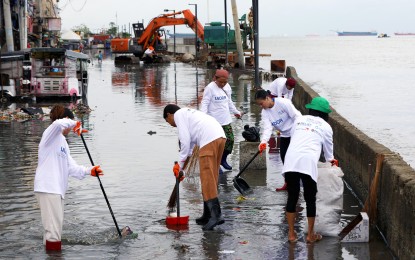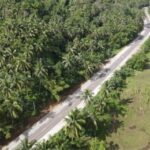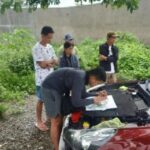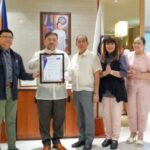MANILA – The Department of the Interior and Local Government (DILG) has collected over 133 million kilograms of garbage nationwide through the KALINISAN (Care and Initiative for a Clean Nation) Program since its launch in January 2024.
A key component, the Barangay at Kalinisan Day (BARKADA), mandates weekly clean-ups in every village every Saturday.
From Jan. 6, 2024, to May 3, 2025, over 22,000 communities have cleaned four million sites nationwide. The activities engage about 500,000 participants weekly, including 166,000 village officials.
KALINISAN mobilizes local governments and communities for regular cleanup. It addresses solid waste management while directly supporting flood prevention efforts by clearing waterways, drainage systems, and public spaces of clog-causing debris and plastic waste.
This is part of President Ferdinand R. Marcos Jr.’s vision for a clean, safe, and disaster-resilient New Philippines.
The program ensures proper waste disposal through segregation, transport to transfer stations, recycling in Materials Recovery Facilities, and composting. Initiatives like waste-to-goods exchange and composted fertilizer for community gardens prevent plastics and other clog-prone waste from entering waterways, reducing the risk of urban flooding.
KALINISAN, more than a cleanup drive, is a disaster risk reduction, public health, and nation-building strategy, proving that clean communities are safer, healthier, and more resilient against floods, disease, and disorder.
Baseco Compound
Baseco Compound is a large informal settlement located along Manila Bay in Tondo, Manila, Philippines. Originally a shipyard in the early 20th century, it became a densely populated urban poor community, home to thousands of families living in challenging conditions. The area has faced issues such as poverty and lack of infrastructure, though some government and NGO initiatives have aimed to improve living standards.
Tondo
Tondo is a historic district in Manila, Philippines, known as one of the oldest populated areas in the city. It was a major center of trade and politics during the pre-colonial era, ruled by local leaders before Spanish colonization in the 16th century. Today, Tondo is a densely populated urban area, often associated with poverty but also rich in cultural heritage and resilience.
Manila
Manila, the capital of the Philippines, is a vibrant city with a rich history dating back to its founding in 1571 by Spanish conquistadors. It served as a key colonial hub for trade and culture, blending indigenous, Spanish, and Asian influences, evident in landmarks like Intramuros, the historic walled city. Today, Manila is a bustling metropolis known for its dynamic mix of modern development and historical heritage.
KALINISAN Program
The **KALINISAN Program** (Kalinga at Inisyatiba para sa Malinis na Bayan) is a community-based environmental initiative in the Philippines aimed at promoting cleanliness, waste management, and sustainable practices. Launched by local governments and organizations, it encourages citizen participation in clean-up drives, recycling, and proper waste disposal to improve public health and environmental conservation. The program reflects broader efforts to address pollution and foster eco-friendly habits in Filipino communities.
Barangay at Kalinisan Day (BARKADA)
Barangay at Kalinisan Day (BARKADA) is a community-driven initiative in the Philippines that promotes cleanliness and environmental responsibility through collective action. The program encourages local residents (barangays) to participate in regular clean-up drives, waste management education, and neighborhood beautification. Rooted in the spirit of *bayanihan* (community cooperation), BARKADA fosters civic pride and sustainable practices to improve public health and environmental quality.
Materials Recovery Facilities
Materials Recovery Facilities (MRFs) are specialized plants designed to sort and process recyclable materials from waste streams, enabling recovery for reuse. They emerged in the late 20th century as environmental awareness grew, helping municipalities and businesses meet recycling goals. Modern MRFs use a combination of manual labor and advanced technology, such as conveyor belts, magnets, and optical sorters, to separate materials like paper, plastics, glass, and metals efficiently.
New Philippines
„New Philippines“ is not a widely recognized historical or cultural site, so it may refer to a modern development, community, or conceptual project. If it pertains to a specific place, it could symbolize revitalization efforts or a new settlement inspired by Filipino culture. Without more context, its history and significance remain unclear—additional details would help provide a more accurate summary.
Department of the Interior and Local Government (DILG)
The **Department of the Interior and Local Government (DILG)** is a Philippine government agency responsible for promoting peace, ensuring public order, and overseeing local governance. Established in 1897 during the revolutionary government, it evolved through various forms before becoming the DILG in 1990 under President Corazon Aquino. Today, it supervises local government units, enforces decentralization, and supports community development programs.






